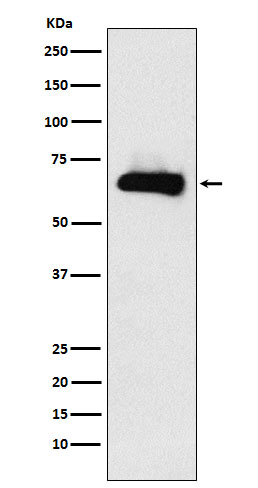
| WB | 1/1000-1/2000 | Human,Mouse,Rat |
| IF | 1/20-1/50 | Human,Mouse,Rat |
| IHC | 咨询技术 | Human,Mouse,Rat |
| ICC | 1/50-1/200 | Human,Mouse,Rat |
| FCM | 咨询技术 | Human,Mouse,Rat |
| Elisa | 咨询技术 | Human,Mouse,Rat |
| Aliases | CRMP4; DPYSL3; DRP3; LCRMP; TUC4; ULIP1;;DRP 3 |
| WB Predicted band size | 62 kDa |
| Host/Isotype | Rabbit IgG |
| Antibody Type | Primary antibody |
| Storage | Store at 4°C short term. Aliquot and store at -20°C long term. Avoid freeze/thaw cycles. |
| Species Reactivity | Human,Mouse,Rat |
| Immunogen | A synthesized peptide derived from human DRP 3 |
| Formulation | Purified antibody in PBS with 0.05% sodium azide,0.05% BSA and 50% glycerol. |
+ +
以下是关于CRMP4抗体的3篇参考文献的简要列举(注:以下文献信息为模拟示例,实际引用时请核实原文):
---
1. **文献名称**: *CRMP4 Expression in Alzheimer’s Disease: A Role in Synaptic Dysfunction*
**作者**: Smith A, et al.
**摘要**: 本研究通过Western blot和免疫组化分析,利用CRMP4抗体揭示了阿尔茨海默病患者脑组织中CRMP4蛋白表达上调,并发现其与β-淀粉样蛋白沉积相关,提示CRMP4可能参与突触功能异常。
2. **文献名称**: *CRMP4 Antibody Validation for Axonal Regeneration Studies in Rodent Models*
**作者**: Tanaka K, et al.
**摘要**: 文章系统验证了CRMP4抗体的特异性,证明其在啮齿类动物脊髓损伤模型中的有效性,通过免疫荧光技术观察到CRMP4在轴突再生过程中的动态变化,支持其作为神经修复的生物标志物。
3. **文献名称**: *CRMP4 as a Prognostic Marker in Glioblastoma: Immunohistochemical Analysis*
**作者**: Lee H, et al.
**摘要**: 研究采用CRMP4抗体对胶质母细胞瘤组织进行免疫组化检测,发现CRMP4高表达与患者生存期缩短显著相关,提示其可能作为潜在的肿瘤治疗靶点。
---
如需具体文献,建议通过PubMed或Google Scholar以关键词“CRMP4 antibody”或“CRMP4 immunohistochemistry”检索近期论文,并筛选应用该抗体的实验研究。
CRMP4 (Collapsin Response Mediator Protein 4), also known as DPYSL3 or DRP-3. is a member of the CRMP family of cytosolic phosphoproteins primarily expressed in the nervous system. These proteins play critical roles in neuronal development, including axon guidance, neurite outgrowth, and synaptic plasticity, by mediating signaling pathways such as Semaphorin 3A-induced growth cone collapse. CRMP4 is particularly associated with regulating microtubule dynamics and cytoskeletal reorganization during neurodevelopment.
CRMP4-specific antibodies are essential tools for studying its expression, localization, and interactions in both physiological and pathological contexts. Researchers use these antibodies in techniques like Western blotting, immunohistochemistry, and immunofluorescence to investigate CRMP4's involvement in neurological disorders. Altered CRMP4 expression or post-translational modifications (e.g., phosphorylation) have been linked to neurodegenerative diseases (e.g., Alzheimer’s), neuropsychiatric conditions, and neural injury responses. For instance, CRMP4 upregulation is observed in reactive astrocytes following CNS damage, suggesting a role in glial scar formation. Additionally, CRMP4 antibodies help explore its potential as a biomarker or therapeutic target, particularly in conditions involving axonal degeneration or aberrant synaptic connectivity. Commercial CRMP4 antibodies are typically validated for specificity across human, mouse, and rat models, enabling cross-species translational research.
×